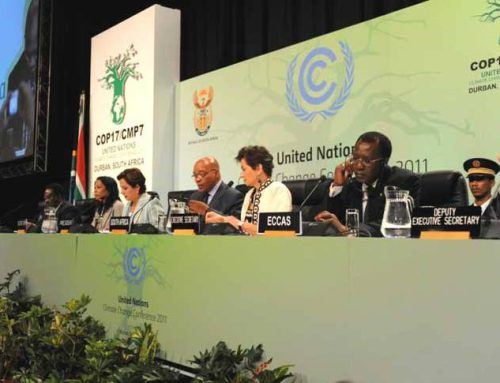 Caring about people is the formula for success, says Wits alumnus Stan Bergman who heads up a US$9-billion company in New York.
Caring about people is the formula for success, says Wits alumnus Stan Bergman who heads up a US$9-billion company in New York.
Stan Bergman and I have a scheduled telephone interview for 8.15am his time New York, 2.15pm our time South Africa. Shortly before the appointed hour his PA calls and says “You have a scheduled appointment with Mr Bergman but…”
Waiting for the “could we schedule it for another day” and feeling that familiar blend of annoyance and disappointment, I am pleasantly surprised when she says “Mr Bergman would like to know if you can give him ten minutes grace”. Ten minutes – how beautifully considerate. In this age when punctuality is too often regarded as old-fashioned I like him already.
I don’t know why he needed the ten minutes; maybe he was finishing his breakfast; maybe he was concluding a meeting with the President of the United States. It really doesn’t matter; what matters is that Stan Bergman had already proved his people skills and professionalism before the interview started.
And when it did, it came as no surprise that this Wits alumnus who heads up an US$9-billion a year Fortune 500 company called Henry Schein, has built the business on a maxim he learnt from his Mother: ‘Care about people’. “She taught me that if you treat people how you want to be treated, things work out,” says the man who is frequently asked by Wall Street reporters and financial analysts to share the formula for his company’s success.
“They expect me to respond with some kind of GDP multiplied by this or that, but my answer is always the same: it’s all about caring about people. The most successful, enduring business people and leaders in the world are the ones that care about people.”
Bergman believes in giving and caring. He gives of himself, he gives to education, the Arts and communities worldwide, and he looks after the 15 000 staff members in 25 countries who collaborate to make a success of Henry Schein – the world’s largest distributor of dental, medical and animal health products and services to a client base of over 775 000 customers representing over one million practitioners worldwide. Which is why Henry Schein is a Fortune ‘Most Admired’ Company ranked No1 overall in its industry, and No1 for social responsibility, global competitiveness, quality of management, quality of products and services, and long-term investment.
“I strongly believe the more you give, the more you get back. I’m not talking about getting back financially, I’m talking in terms of the inspiring people you meet and the enriching experiences you have,” says Bergman who has also given to Wits. As the Chair of the Wits Fund Inc in New York, he and other US-based alumni have been extraordinarily generous in supporting Wits and the Wits Fund. “I received an amazing education at Wits and I would not have been able to function at the level I do without this,” he says, adding: “I certainly wasn’t a great student but I learnt a lot.”
Bergman graduated with his BCom in 1972, his Certificate in the Theory of Accounting in 1973. He is a Chartered Accountant (SA) and Public Accountant (NY).
Now 62 years of age, he fondly recalls his student years, when he shared an apartment with his friend Ivan Saltzman in Greenside who in 1978 established what is now the leading South African pharmacy chain Dis-Chem “from nothing” and still heads it and lives in Johannesburg.
Henry Schein, going back 80 years, also started as a one-man show, when in 1932 Henry Schein borrowed US$500 to open a pharmacy in Queens, New York with his wife Esther. That small pharmacy grew into the giant it is today. Bergman and his team (amongst whom most of the top executives have been with the company for over 20 years) can take the credit for this. He joined Henry Schein in 1980 and became CEO in 1989. At that time the business was doing US$250 a year. “We’ve grown,” he says.
Bergman today is a true New Yorker. He shares an apartment with his medical specialist wife Dr Marion Bergman, also a Wits alumnus (MBBCh 1974) on the 87th floor of an apartment block on 1st Ave, across the road from the United Nations building. “It’s wonderful, we have a 300-degree view but it’s not for those with a fear of heights.”
It’s worlds away from the small apartment at the bottom of Nugget Street in Johannesburg that he and Marion shared when they were first married. “Our rent was R50 a month and I had just started my first job as an accountant in 1974 on a salary of R350 a month.”
It’s also worlds away from the African bush, which is his favourite destination. “Sunrise in the African bush – nothing to beat it,” says Bergman who retains strong ties with South Africa and other countries in Africa, notably Tanzania, where he and Marion, through Henry Schein’s global social responsibility programme, has refurbished the only dental school in Tanzania. Marion is now deeply involved in oral health policy there.
The Bergmans have also significantly supported medical education in South Africa. In the 1990s they were energetic members of an organisation called Medical Education for South African Blacks (MESAB), which provided approximately 7000 scholarships for South African medical students. Marion was the treasurer and served MESAB’s board. “The current Dean of Health Sciences at Wits, Professor Ahmed Wadee worked closely with us on this,” says Bergman.
Their philanthropic drive has been passed on to their two sons. Their younger son Eddie (32) who serves as the Executive Director of the Africa Travel Association (the leading public-private partnership committed to advancing tourism to the African continent) founded Miracle Corners of the World – a non-profit organisation that empowers young people in Africa to become positive agents of change in their communities (www.miraclecorners.org).
Their older son Paul (33), who recently joined a private equity firm in Latin America specialising in agri business, has been involved in agricultural related businesses in Africa, Latin America and Asia for more than twelve years.
Both sons have strong ties with the Africa continent through their parents, their studies and through friendships formed with South Africans. Paul met a number of South African students who were at the University of Pennsylvania at the same time as him. He also did research at Wits for a BEE study he was doing during his degree. Eddie got involved in Africa House at New York University, and both have visited South Africa several times.
Stan and Marion left the country for political reasons in 1975. “From the 1990s we started visiting South Africa fairly regularly again,” says Bergman who grew up in Port Elizabeth and has a strong association with the Karoo.
“I had asthma as a young kid and my parents would send me to a sheep farm called Doornfontein near Cradock during school holidays from the age of five. The hot dry Karoo climate was considered beneficial and I think it worked because my asthma went away.”
It was here that he first honed his people and business skills. “The Bowen family who owned the farm had a little concession store – mainly canned foods, sodas and some candy – and I would run it when I was there,” he recalls. “I knew what I was doing because my parents had a department store in Port Elizabeth,” says Bergman who was a natural at commerce – he started a stamp trading business and he traded shares from a very young age.
Between his family’s business and the farm store he learnt how important people are, not only to business but also to community life. “On a farm there’s obviously a pecking order between the owners and the staff but everyone lives closely together, and I learned about different cultures and mixed with everyone on the farm. I loved my time there, and I have strong memories of learning to ride horses and listening to Mrs Bowen, who was an opera singer, playing the piano and singing to us in the evening.”
Both Stan and Marion love the opera and one of the many boards on which Stan serves is the Metropolitan Opera in New York. His favourite opera is Verdi’s La Traviata, which he makes a point of seeing at least once a year. He’s converted many of his staff by booking opera tickets for them. Clearly it permeates the culture at Henry Schein because opera is what I heard when, precisely ten minutes later, Bergman’s PA phoned me back and kept me on hold for a few seconds before transferring me to Stan.




